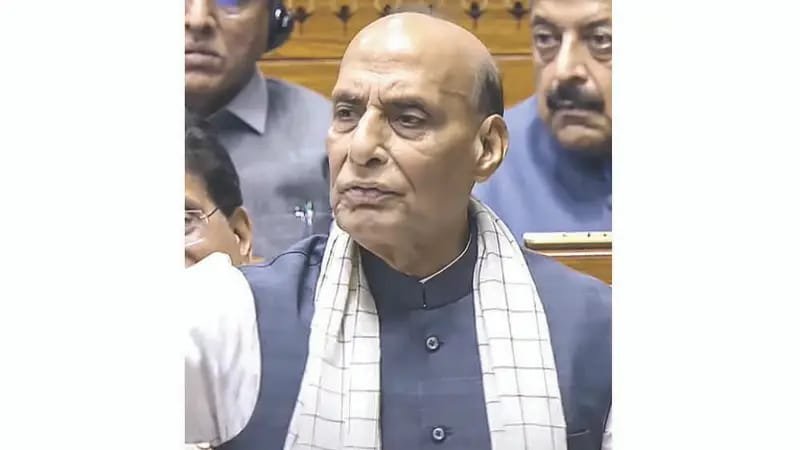NEW DELHI, India – A fiery debate erupted in the Lok Sabha on Monday as the Opposition vehemently challenged the government over alleged “security lapses” leading to the recent Pahalgam terror attack and raised critical questions regarding “Operation Sindoor,” India’s military response. The session saw sharp exchanges, with opposition parties demanding accountability from Home Minister Amit Shah and pressing for clarity on the operation’s abrupt halt, reported losses, and the persistent issue of Pakistan-occupied Kashmir (PoK).
As Parliamentary Fury Over Pahalgam Operation Sindoor, The controversy stems from the brutal Pahalgam attack, which claimed 26 lives, predominantly tourists. In response, India launched “Operation Sindoor,” targeting terror infrastructure within Pakistan. While the government asserts the operation successfully achieved its objectives and is merely “paused,” the Opposition remains unconvinced, accusing the administration of surrendering to external pressure.
Congress MPs led the charge, with Deputy Leader Gaurav Gogoi questioning the government’s sudden decision to halt “Operation Sindoor.” He directly challenged Prime Minister Narendra Modi, asking “before whom did Prime Minister Narendra Modi surrender.” Gogoi further demanded a clear timeline for India’s reclamation of Pakistan-occupied Kashmir (PoK) – a long-standing national aspiration.
A significant point of contention arose from US President Donald Trump’s repeated claims of having brokered a “ceasefire” between India and Pakistan through trade leverage. Gogoi highlighted Trump’s assertion of “five to six jets” being downed, prompting a direct demand to the defence minister for transparency on Indian fighter jet losses during “Operation Sindoor.” Congress MP Deepender Singh Hooda echoed this sentiment, also questioning PM Modi’s “silence” on Trump’s mediation claims and advocating for a halt to cricket ties with Pakistan during ongoing military operations.
TMC MP Kalyan Banerjee likened the “ceasefire” announcement to a cricketer “declaring the innings” on the verge of a century, implying an incomplete mission. NCP (SP) member Supriya Sule emphasized that “Operation Sindoor” cannot be deemed a success until the Pahalgam attackers are brought to justice. Samajwadi Party MP Ramashankar Rajbhar, in a provocative statement, called for “Operation Tandoor” after the Pahalgam attack, to “roast the terrorist responsible,” rather than “Operation Sindoor.”

Defence Minister Rajnath Singh initiated the government’s rebuttal, asserting that “Operation Sindoor” was “on pause” after the armed forces achieved their desired objectives. He warned of a resumption in case of any “misadventure by Islamabad,” emphasizing India’s unwavering commitment to uprooting terrorism. Singh detailed Pakistan’s retaliatory attacks using missiles, drones, and rockets, but stressed that they “failed to cause any damage to any establishment” in India.
Both Defence Minister Singh and External Affairs Minister S Jaishankar strongly dismissed the Opposition’s claims linking the cessation of hostilities to alleged US President Donald Trump’s mediation or trade deals. Jaishankar underscored that any decision regarding the operation was based on strategic objectives and not external pressure.
The debate, allocated 16 hours, is expected to continue, with Home Minister Amit Shah and Leader of the Opposition Rahul Gandhi slated as key speakers on Tuesday. Prime Minister Narendra Modi is anticipated to deliver the concluding remarks, promising further insights into the government’s perspective on “Operation Sindoor” and India’s security posture. The ongoing parliamentary discussion highlights the deep political divisions and the nation’s demand for clear answers on critical issues of national security and foreign policy in the aftermath of the Pahalgam attack.
The heated exchanges in Lok Sabha on Monday as Parliamentary Fury Over Pahalgam Operation Sindoor emphasise the intense scrutiny the government faces following the tragic Pahalgam attack and the subsequent “Operation Sindoor.” As the debate continues, the Opposition’s relentless questioning highlights a significant demand for greater transparency and accountability regarding national security operations. From the specific number of Indian jets downed, as alleged by President Donald Trump, to the broader strategic implications of the “ceasefire,” the government is under pressure to provide concrete answers that can assuage public concern and counter narratives of external influence.
The calls for Home Minister Amit Shah to take responsibility for security lapses, coupled with the renewed focus on reclaiming Pakistan-occupied Kashmir, reflect a deep-seated desire within a segment of the political landscape to see a more decisive and unequivocal stance against terrorism and territorial disputes. The contrasting viewpoints—the government’s assertion of achieved objectives versus the Opposition’s demands for a complete and decisive victory—reveal the political tightrope walk in managing public expectations and geopolitical realities.
With Home Minister Shah, Leader of the Opposition Rahul Gandhi, and potentially Prime Minister Modi himself slated to speak, the coming days will be crucial in shaping the public’s understanding of “Operation Sindoor” and the government’s long-term strategy for counter-terrorism and regional stability. This parliamentary showdown is more than just a political debate; it’s a reflection of India’s ongoing struggle with cross-border terrorism, its aspirations for a secure future, and the democratic process of holding its leaders to account on matters of national importance. The outcomes of these discussions will undoubtedly resonate far beyond the walls of Parliament, influencing public confidence and potentially redefining the nation’s approach to its most pressing security challenges.
